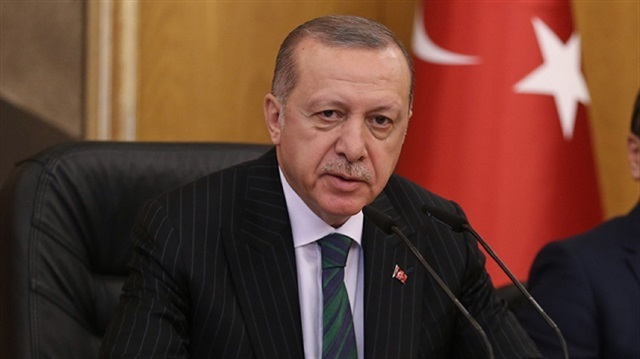
‘Our foreign minister is due to visit the U.S. He will discuss Manbij with U.S. Secretary of State Mike Pompeo. We hope that the necessary steps to clear Manbij of the YPG and PYD will be taken,’ says Erdoğan
Turkish President Recep Tayyip Erdoğan evaluated various matters including the upcoming elections, economy, defense and international relations during his return trip from South Korea.
“It is not a democratic approach for some European countries to display a stance against our politicians and citizens. Everyone should respect the elections and the campaigns. We did not shy away from congratulating elected European leaders, because we want our ties to be strong,” said Erdoğan.
Last month, the parliament passed a bill calling for early elections on June 24, cementing Turkey’s move to a presidential system.
In the April 2017 referendum, Turkish voters approved the switching from a parliamentary system to a presidential one.
“We will resolutely continue on our path. In an environment where some European countries are debating whether or not to allow us to use their facilities [for campaigning], we chose to meet with our citizens in Bosnia and Herzegovina. I will attend the rally, where we expect the participation of about 9,000 to 10,000 people,” he added.
“The opposition is making no efforts to add something to this country. The failure of the opposition to name a presidential candidate for all this time clearly shows their failure. [MHP leader Devlet] Bahçeli and I are continuing on our path in a sincere manner. The candidate of the Public Alliance is clear,” Erdoğan said, referring to the alliance formed between the ruling Justice and Development (AK) Party and MHP.
Turkey's main opposition Republican People's Party (CHP) nominated Muharrem Ince as its presidential candidate on Friday, less than three weeks before the June 24 early elections.
“Research has shown that the Public Alliance is far ahead of the opposition. I am sure that the people will give us the necessary support on June 24,” Erdoğan said.

The president slammed Standard & Poor's (S&P) lowering Turkey’s credit rating.
“This move is political. They made the move before the elections. They will be forced to retract this wrong move. Turkey’s economy and exports are growing. They downgraded our credit rating while exports were increasing. Turkey’s tourist count has almost reached 40 million, and we are expecting profits of 28 to 29 billion dollars. Great steps are being taken in the defense industry,” Erdoğan said.
“It is meaningless for Turkey’s credit rating to be downgraded when all economic signs are positive. We will attend the Turkish - British ‘Tatlı Dil’ [mellifluence] Forum from May 13 to 14 in Britain. I will meet with the Queen as well as Prime Minister [Theresa] May. We place great importance on further strengthening our ties with Britain. Long story short, S&P’s rating downgrade does not mean anything for Turkey,” he added.
Erdoğan’s comments came after the international credit rating agency downgraded Turkey's sovereign credit rating to BB-/B from BB/B with a stable outlook.
“Talks are continuing between our Undersecretary of Defense Industry and their Korean counterparts. With their defense industry officials, our Chief of General Staff and Defense Industry Undersecretariat have made negotiations. In the next phase, will take steps with their visit to Turkey,” Erdoğan said.
“The Koreans also have great experience with missiles. We must also take all necessary precautions in accordance with global developments. We saw that this was important in the Afrin and Euphrates Shield operations. We will also make some new productions in the defense industry. With this, our troops will become much stronger,” he added.

The U.S. had pledged to withdraw the People’s Protection Units (YPG), the armed wing of the Democratic Union Party (PYD), from Manbij, which is located approximately 25 miles from Turkey’s border, to the west of the Euphrates but has thus far failed to fulfill its promise.
“The operation in Afrin is not yet complete. We have obtained great results regarding the clearing of improvised explosive devices. Our foreign minister is due to visit the U.S. He will discuss Manbij with U.S. Secretary of State Mike Pompeo during that visit. We hope that the necessary steps to clear Manbij of the YPG and PYD will be taken,” Erdoğan said.
The YPG and PYD are Syrian branches of the Kurdistan Workers’ Party (PKK), which is listed as a terrorist organization by Turkey, the EU and U.S.
Turkey launched Operation Olive Branch on Jan. 20 to clear YPG/PKK and Daesh terrorist groups from Afrin in northwestern Syria amid growing threats from the region.
On March 18, Turkish-backed troops liberated Afrin town center, which had been a major hideout for the YPG/PKK since 2012.
“We have good relations with the West, just as we do with Russia. Nobody can sour relations between us and other countries. [French President Emmanuel] Macron wanted to join the Astana and Sochi summits. When he told me this, I told him I would discuss it with [Iranian President Hassan] Rouhani and [Russian President Vladimir] Putin and invite him if they accepted. As a result of our discussions, we said it could occur in the form of a 3+1 meeting. When we told Macron, he gave developments in Douma and Idlib as an excuse and said he would not be able to attend,” said Erdoğan referring to comments made by French President Emmanuel Macron claiming that the joint missile strikes conducted by France, Britain and the United States against Syria targeted Turkey’s relations with Russia.
“With those strikes we have separated the Russians and the Turks on this. The Turks condemned the chemical weapons,” Macron said in April.
Erdoğan also commented on Macron’s claims that in order to reduce Turkey and Russia’s influence in the Balkans, they must be accepted into the European Union.
“Turkey has deep historical and cultural ties to the Balkans, as well as some of our people who live t


